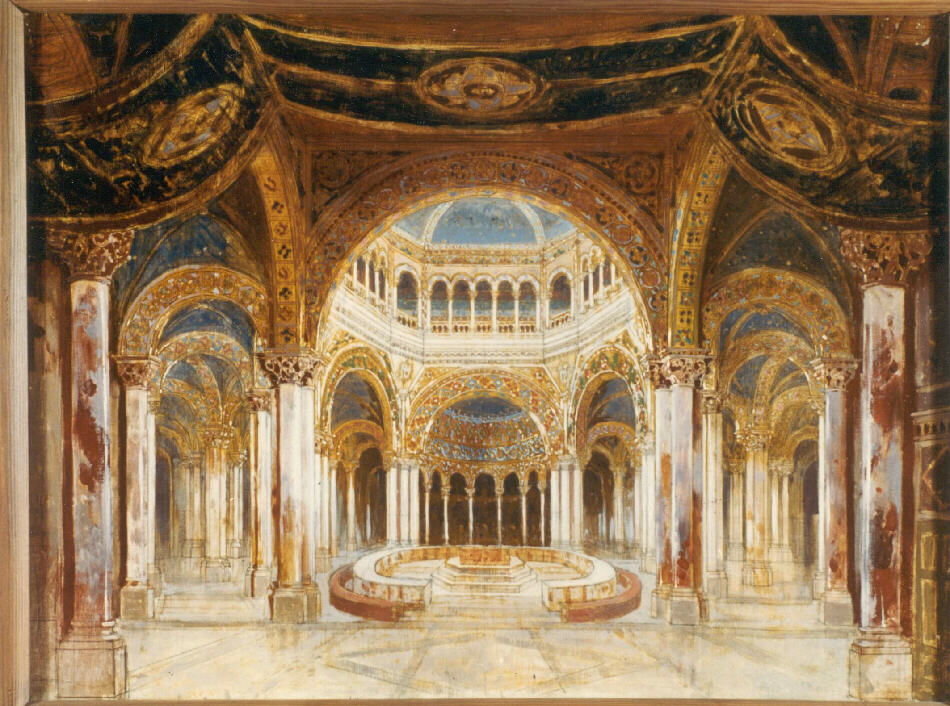
Paul von Joukowsky, design for a set of Parsifal, 1882
Go North, Young Man
Parsifal, Stage Consecration Festival Play in three acts, music and libretto by Richard Wagner, based on the poem Parzival by Wolfram von Eschenbach, Opera North Orchestra and Chorus conducted by Richard Farnes, directed by Sam Brown, concert performance at London’s Royal Festival Hall, 26th June 2022, reviewed by Leslie Jones
When Richard Wagner presented his wife Cosima with the second prose draft of Parsifal, she wrote in her diary, on 28th February 1877, “This is bliss, this is sublimity and devotion!…The redeemer unbound!”. Numerous other critics have endorsed this judgment. According to Frankfurt School social theorist Theodor Adorno, “Wagner’s criticism of the opera carries great weight”. Wagner, he contended, considered opera as “childish” and that music should “finally come of age” (see ‘Wagner’s Relevance for Today’, an essay based on a lecture delivered in 1963). Adorno discerned both “progressive” and “negative [nationalistic] traits” in the composer’s oeuvre. He agreed that the familiar, showy forms of Italianate opera, notably the aria, the recitative, the ensemble, were superannuated. Stephen Moss, in similar vein, recalls that Wagner envisaged opera as a “gesamtkunstwerk”’ or “total art work”. He thereby ushered in a much needed revolution in opera (‘A to Z of Wagner; G is for Gesamtkunstwerk’, the Guardian, April 18, 2013).
Parsifal lends itself to diverse interpretations. Adorno’s original view of Wagner, elaborated in his 1952 book In Search of Wagner, was entirely negative but was challenged by the late Roger Scruton, who noted that Wagner once stated “I do not believe in God but I believe in godliness [Göttlichkeit)”. By accepting the need for redemption through sacrifice, a recurrent theme in Wagner’s music dramas, “…we begin to live under divine jurisdiction”, according to Scruton. The Slovenian philosopher and psycho-analyst Slavoj Žižek, like Scruton, detects a “truer meaning” in Wagner’s oeuvre. He considers Tristan and Parsifal “the two…greatest works of art in the history of mankind”. For Žižek, Amfortas’ wound represents “the Hegelian spirit”, which opened up a gap in nature, once a unity. A more conventional Freudian interpretation of Parsifal was presented by Tom Artin at the Freud Museum London in 2016, in a paper entitled ‘Primal Scene/Primal Wound, the Psychoanalytic Arc of Parsifal’. Karl Abraham, Artin reminds us, regarded the female genitalia as a wound. For Artin, Wagner “anticipated Freud in his depiction of the unconscious processes of the mind”.
What would Wagner have made of Opera North’s Parsifal at the Royal Festival Hall? Since this was a concert performance, it hardly constituted “the total integration of music and drama” proposed by the composer. Admittedly, Brindley Sherratt as Gurnemanz, Toby Spence as Parsifal and Robert Hayward as Amfortas, amongst others, put in powerful vocal performances. The score, as always, was hypnotic and the acoustic at Festival Hall was cleverly exploited by the conductor. But acting as such, plus costumes, scenery etc – all were dispensed with and the leading singers performed from a set of identical chairs lined up at the front of the stage. And sadly, what Opera North called “the ultimate Parsifal experience”, with its “atmospheric sets, creative costumes etc” (previously semi-staged in Leeds) has now “… melted as breath into the wind”. “Would they had stayed!”
Dr Leslie Jones is the Editor of QR
Editorial addendum; on Saturday 2nd July 2022, Radio 3 broadcast a semi-staged performance of Parsifal by Opera North, recorded at the Grand Theatre, Leeds











Reduced to a stunt, as usual.